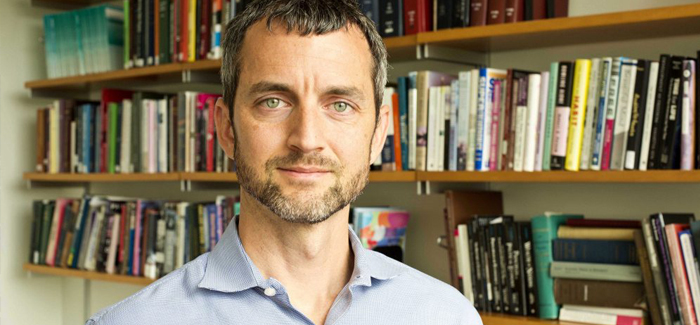
Matthew Gentzkow, the Richard O. Ryan professor of economics and Neubauer Family Faculty Fellow, has been named the 2014 John Bates Clark Medal winner. (Photo courtesy University of Chicago Booth School of Business)
New direction for Argonne, Chicago Booth economist wins Clark Medal, Law School dean reappointed, Marine Biological Lab announces inaugural Lillie research awards, UChicago Local gives business a boost, online course offerings expand, and more.
Gentzkow earns Clark medal
Chicago Booth’s Matthew Gentzkow has received the American Economic Association’s 2014 John Bates Clark Medal, a biennial honor presented to a leading American economist under 40. Gentzkow, the Richard O. Ryan professor of economics and Neubauer Family Faculty Fellow, is known for studies focusing on political bias in the news media, the social impact of television, and persuasion. Four other current faculty members—Kevin Murphy, PhD’86; Gary Becker, AM’53, PhD’55; James Heckman; and Steven Levitt—have won the Clark Medal. About 40 percent of recipients have gone on to receive the Nobel Prize.
New direction for Argonne
Peter B. Littlewood, a UChicago professor of physics, has been named the 13th director of Argonne National Laboratory. Argonne’s associate laboratory director for physical sciences and engineering since 2011, Littlewood succeeds Eric D. Isaacs, who became University provost on March 31. As associate director, Littlewood oversaw projects including the Advanced Photon Source Upgrade and the Joint Center for Energy Storage Research.
Nanofab
A $15 million gift from the Pritzker Foundation will support a new Institute for Molecular Engineering nanoscale fabrication facility at the William Eckhardt Research Center. The 12,000-square-foot Pritzker Nanofabrication Facility will offer space and equipment for work on new applications in computing, health care, communications, smart materials, and other new technologies.
Retaining counsel
Michael H. Schill has been appointed to a second term as dean of the Law School. (See “Legal Leadership”) Announcing the appointment, President Robert J. Zimmer and Provost Thomas F. Rosenbaum commended Schill for maintaining the Law School’s “intellectual hothouse character and historic interdisciplinary focus.” In his first term Schill oversaw a financial aid expansion that included the Rubenstein Scholars Program and the Cafaro Scholars Program and the launch of the Doctoroff Business Leadership Program and the Law and Economics 2.0 initiative.
Historic scholarship
Four College students received Harry S. Truman Scholarships, the most in school history and a mark only two other institutions have reached since 2001. Third-years Yusef Al-Jarani, Ava Benezra, Andrea Haidar, and Erin Simpson will receive up to $30,000 for graduate education. Since the program’s inception in 1975, UChicago has had 34 Truman Scholars.
Fellow professors
Three University faculty members—Lainie Ross, Haun Saussy, and Joe Thornton—received 2014 Guggenheim Fellowships. Ross, a pediatrician and medical ethicist, has studied issues surrounding genetic testing and shortages of available donor organs. Saussy, University Professor of comparative literature, will use his fellowship to complete his book “Zhuangzi Inside Out: Translation as Citation.” Thornton, professor of human genetics and ecology and evolution, resurrects ancestral genes and traces the mechanisms by which proteins evolve new functions.
Bio innovation
Clare Waterman of the National Institutes of Health and the University of Utah’s Erik M. Jorgensen are the inaugural recipients of the Frank R. Lillie Research Innovation Awards from the University of Chicago and the Marine Biological Laboratory. Named for the early 20th-century embryologist who served as director of the laboratory and chair of the University’s zoology department, the awards represent the first formal research opportunities since the institutions established an affiliation in 2013. Waterman will lead a team investigating molecular mechanisms of cellular movement, shape, and form to better understand cancer and other diseases. Jorgensen’s team will study how changes in the structure and function of neural connections affect brain processes such as memory.
New Graham School dean named
Mark Nemec, a political scientist, higher education expert, and business leader, has been appointed dean of the Graham School of Continuing Liberal and Professional Studies, effective July 1. Currently the president and CEO of Eduventures, which provides higher-education research, data, and advice, Nemec is the author of Ivory Towers and Nationalist Minds: Universities, Leadership, and the Development of the American State (University of Michigan Press, 2006). He succeeds the retiring Dan Shannon, Graham School dean since 1996.
Words with funds
UChicago Medicine’s Thirty Million Words Project will be part of the PNC Foundation’s $19 million initiative to support early-childhood language development. By age 4, poor children have heard 30 million fewer words than their more affluent peers, a disparity that prompted Dana Suskind, professor of surgery and pediatrics, to develop techniques to close the gap. The multiyear PNC grant will help Thirty Million Words reach more parents with a curriculum designed to improve their verbal interaction with their children. Weekly home visits also help parents understand how conversation enhances child brain development while setting goals and monitoring progress.
Act locally
In March the University launched UChicago Local, offering programs for business owners and job seekers in surrounding neighborhoods, along with training and connections to help them work with the University and UChicago Medicine. The initiative focuses on vendors in eight procurement categories and works to attract businesses to the area and help existing ones grow. Speaking at the launch, Chicago mayor Rahm Emanuel said “UChicago Local can serve as a model” for major institutions in the city to increase their economic impact.
.edu(cation)
An agreement with the interactive platform edX will allow the University to expand its online course offerings. Created by the Massachusetts Institute of Technology and Harvard University, edX is a nonprofit consortium of 34 colleges and universities. UChicago courses for edX are in development. Last year the University offered its first two online courses through the education company Coursera with more under way in 2014.
